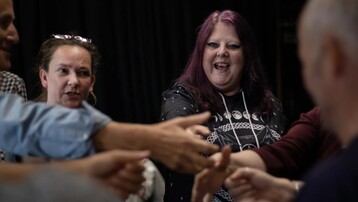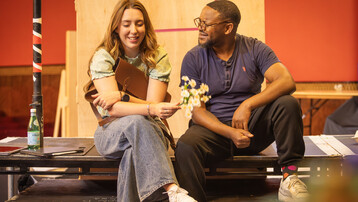News Story
This spring, we're excited to bring three incredible new productions to 16 venues across England. As our cast is busy in rehearsals, we are breaking down this season’s operas – check out everything you need to know below:

Everything you need to know about Stravinsky’s The Rake’s Progress:
When Tom Rakewell comes into an unexpected fortune, he deserts his love, Anne Trulove, for the delights of London with Nick Shadow. Nick leads Tom through a series of poor decisions, proving that ‘for idle hearts and hands and minds, the Devil finds work to do’.
What is it about? Love, loss, dark comedy, corruption, naivety and hubris.
The characters at the centre of the action:
- Tom Rakewell: a playboy
- Anne Trulove: Tom’s fiancée
- Father Trulove: Anne’s father
- Nick Shadow: The Devil
- Baba: The entertainer
- Mother Goose: Brothel owner
- Sellem: An auctioneer
Language: Performed in English with English captions
Composer: Igor Stravinsky

Everything you need to know about Puccini’s Manon Lescaut:
Manon Lescaut is a devastating depiction of a woman wrestling with her desire for love on her own terms. Her struggle will take her through cities, across oceans, and even to prison!
What is it about? Tragedy, betrayal, ironies of fate and society’s hypocrisy.
The characters at the centre of the action:
- Manon: a young woman being sent to a convent by her father
- Lescaut: Manon’s brother
- Des Grieux: Manon’s lover
- Geronte: a wealthy older man who wants Manon for his own
Language: Performed in English with English captions
Composer: Giacomo Puccini

Everything you need to know about our newest children's opera, The Great Stink:
Recommended for aged 7-11, The Great Stink is a hilarious, fun-filled family show about The Great Stink of 1858. Join singers, musicians and puppets in Victorian London and learn all about water pollution and how to positively contribute to our local waterways.What can you expect?
- Poo – lots of it!
- Interactive moments
- Catchy songs
Who will you meet?
- Joseph Bazalgette: Civil Engineer that created a central London sewerage system
- Theresa: Joseph’s daughter, a young girl working to improve the environmental
- Queen Victoria
- Victorian Prime Minister Benjamin Disraeli
- The river Thames!
Language: English with English captions
Composer: Omar Shahryar
Writer: Hannah Khalil
Never been to an opera before? Not to worry! Here are the top tips for your first time visiting an opera performance...
What is an opera? Opera tells stories through music!
- Opera celebrates the amazing capabilities of the human voice; all singers perform without microphones, projecting over a live orchestra
- Throughout the performance, the singing never stops. Even dialogue will be spoken or sung in rhythm.
- Opera is characterised by dramatic themes of passion and intensity, expressing the highest highs and lowest lows of emotion.
Worried you won’t understand an opera? Check this out...
- All of English Touring Opera’s performances, even those sung in English, feature surtitles on a screen next to the stage. These screens project text of what is being sung so that you can better understand the singers and follow along with the plot.
- The story of an opera isn’t just told through singing; the sets, costumes and acting will all help you to connect with the story as well!
How can you show your support for the opera during the show?
- To wish an opera cast good luck, swap ‘Break a leg!’ for the phrase ‘Toi Toi Toi!’ (pronounced toy-toy-toy)
- When you’re impressed by a performance, show your enthusiasm by clapping at the end of an aria. To express further support, throw in a ‘bravo!’ (well done) or ‘encore’ (I want to hear it again!)
Helpful vocab to know before your first opera:
- Overture – At the beginning of an opera, the orchestra plays pieces of music that you’ll hear throughout the rest of the opera
- Libretto – the words being sung in an opera
- Recitative – words used for dialogue in operas. Usually sung with many words on the same note in a free rhythm that mimics ordinary speech.
- Coloratura – singing in elaborate melodies
- Aria – a piece of music performed by a solo singer, accompanied by instruments.


